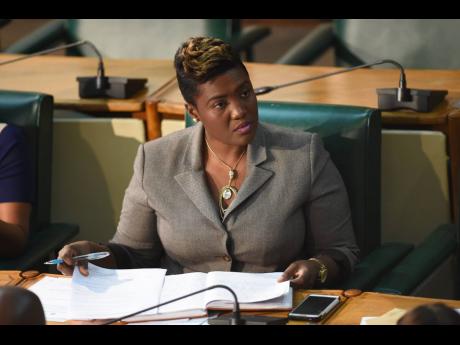Laws needed to govern ‘rent a womb industry’ – stakeholders
As the ‘rent a womb industry’ increases in popularity across Jamaica, concerns are being raised about the importance of legislation to, among other things, protect vulnerable women from being exploited.
Since The Sunday Gleaner highlighted the growth of the surrogacy industry in the country several weeks ago, Government Senator Kerensia Morrison has called for consultations with relevant stakeholders to craft an appropriate policy.
A surrogate is a woman who bears a child for someone else, usually because that person is unable to become pregnant. Increasingly, persons from all over the world who desire to be parents have been seeking women to be surrogates, which has led to a big boom in the industry, many women even using it as their source of income. And more and more Jamaican women are now cashing in.
In 2017, an international journal on sexual and reproductive health and rights, titled ‘Babies, Borders and Big Business’, stated that “the worth of the commercial surrogacy industry is estimated at around US$2.3 billion annually”.
DUTY TO PROTECT
And BBC News, in an article earlier this year, reported that, “As far back as 2012 the industry around surrogacy was worth an estimated US$6 billion (£4.7 billion) a year.”
“We are speaking about women who are unable to carry a child for whatever reason, and we certainly want to take their desire into consideration for raising a family. But, at the same time, we also have women in society who are vulnerable because of poverty and who may want to see this as an opportunity, not necessarily to enrich themselves, but maybe see it as a way of earning a living, offering themselves in this way with very little knowledge of the pitfalls in this industry,” said Morrison.
“We have a duty to speak for them, we have a duty to protect them, and we have a duty to ensure that they make use of the right options. We have to ensure that there is healthcare that will speak to the different fallout that may happen. We have to ensure that they are not at all exploited, and their rights are protected.”
Morrison’s concerns echoed those of countries like India, which banned commercial surrogacy because persons from abroad who could afford it saw the country as fertile ground. The ban sought to protect vulnerable women from exploitation.
NEW TYPE OF SLAVERY
“In its most extreme analysis, this could be a new type of slavery about to emerge within regional waters. We have to pay attention to this and ensure that as far as Jamaica is concern, there would be no buying and selling of babies here; not at all,” said Morrison.
“We have called for consultations, then we will sit down, talk, craft policies, look at the legislation, and look at how we are going to regulate this thing. I want to go full circle on this matter.”
There are numerous cases that reveal what could go wrong before and after surrogacy that notable persons overseas have provided as a framework that could be used in crafting policies.
Meanwhile, attorney-at-law Sherry-Ann McGregor said she was pleased that concerns about the surrogacy industry have got the attention of the legislators.
“My hope is that there is a comprehensive review of the entire issue, concerning not only surrogacy but IVF (in vitro fertilisation) and other matters, for example, DNA testing to verify paternity, which is still not a part of the legislation that deals with the declaration of paternity,” said McGregor.
“I hope that the fact that the media has brought the issue to the fore will not mean that the legislators will focus on it now and then it will die in the water. I hope that a concerted effort will be made to ensure that the issue gets the proper attention that it deserves.”
Obstetrician and gynaecologist, and director of the Hugh Wynter Fertility Management Unit, Dr Vernon DaCosta, said that this month they will be hosting a workshop on surrogacy to start a conversation with the Government surrounding legislation.

